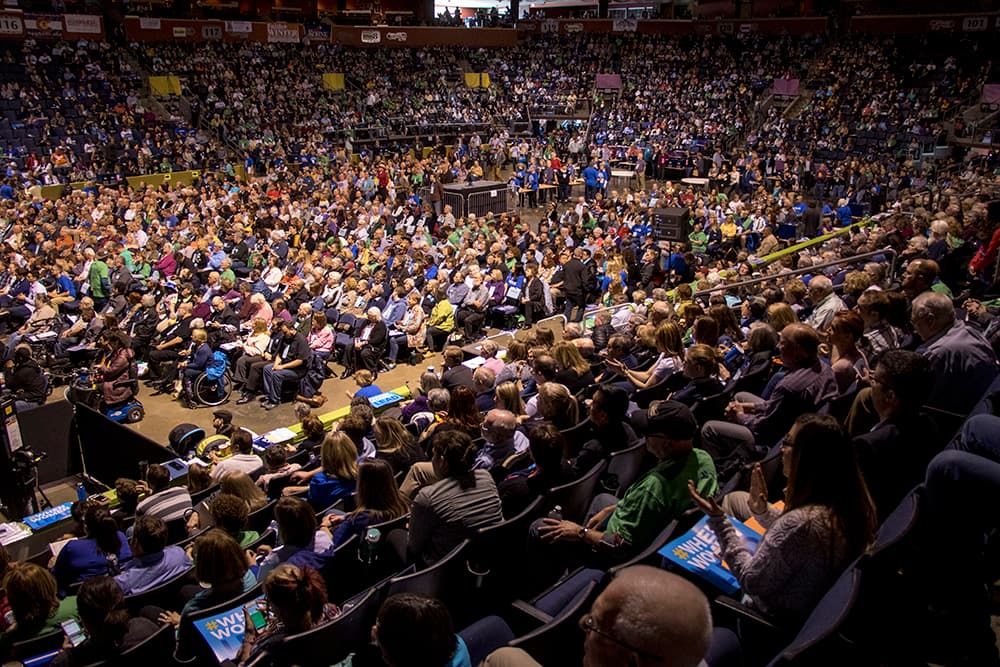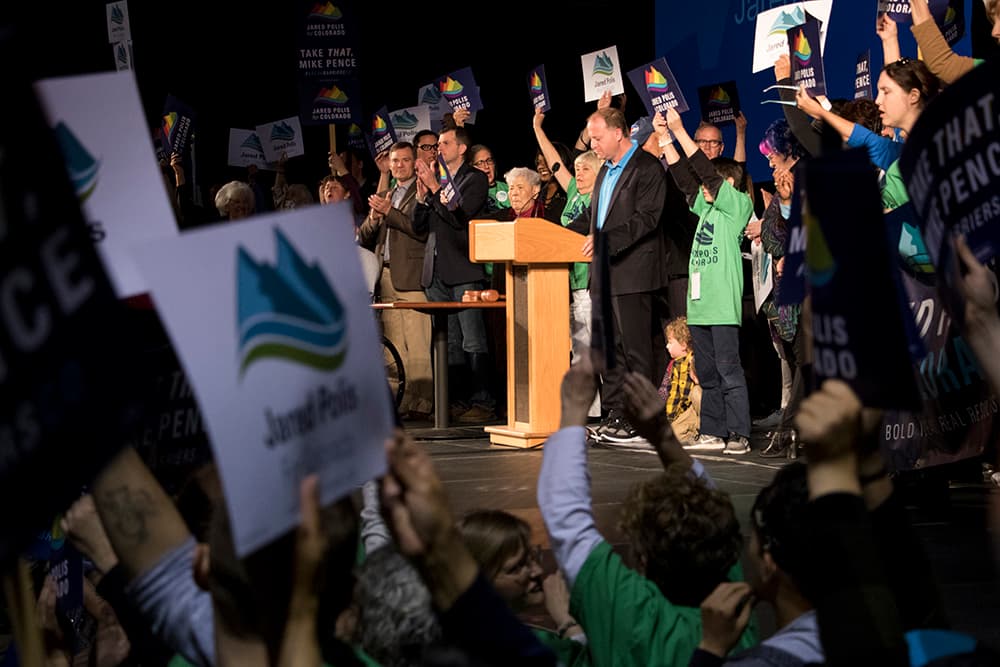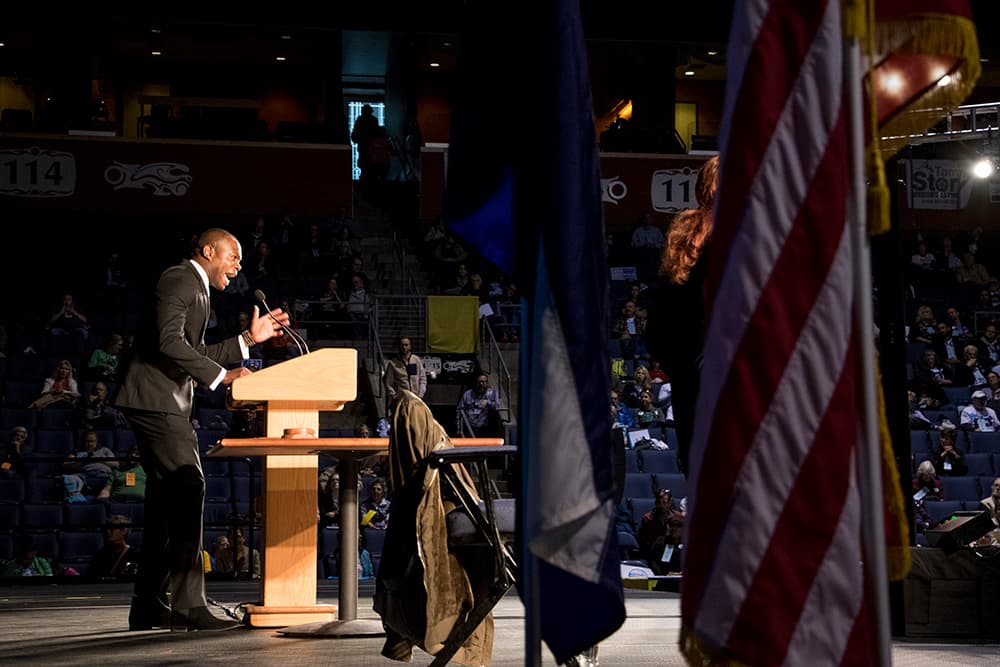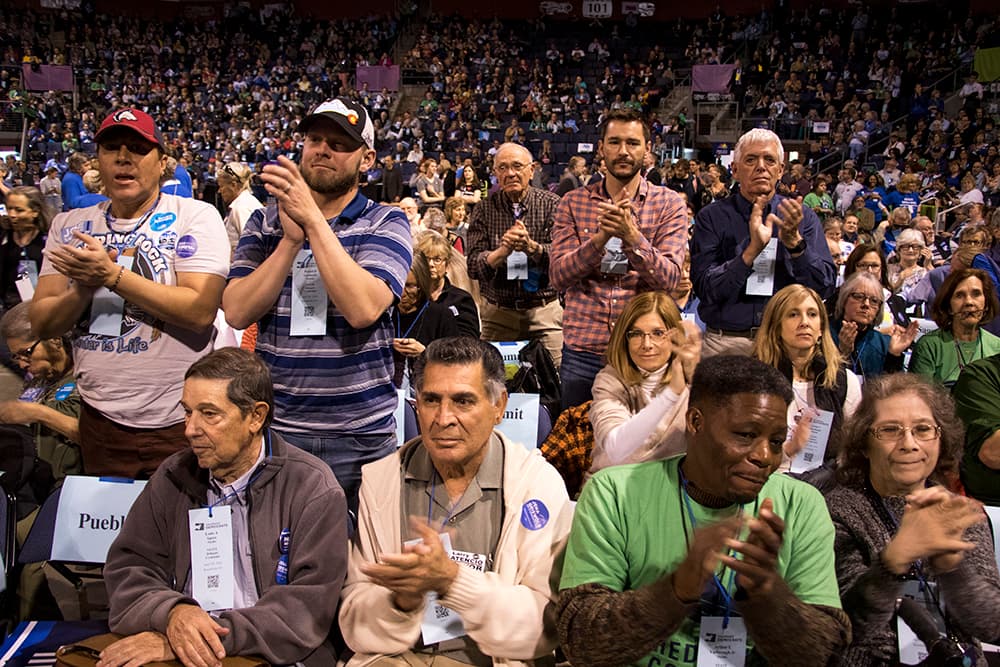
By Andrew Kenney and Allan Tellis
The words "blue wave" were repeated again and again as thousands of die-hard Democrats gathered on Saturday in Broomfield to choose primary candidates.
The phrase was shouted from the stage, chanted in the crowd and even uttered in the line for tacos. The crowd at the 1stBank Center was riding high, with many convinced that they would surpass the high expectations for Democrats this year -- but the party's fault lines were on display, too, especially among younger voters.
First, let's see the results.
The delegates selected some of the candidates who will appear in the party's primary elections. The winner of each primary election will get to represent the Democrats in the general election.
Governor: Cary Kennedy again showed her strong party support, winning 62 percent of the delegates' votes. Jared Polis was in second with 33 percent. Now, both will appear on the primary ballot, while Erik Underwood will not. Mike Johnston has already qualified by submitting signatures.

"I'm going to get on the road and criss-cross the state," Kennedy said in an interview, explaining how she would build from her party win.
In the race for attorney general, Phil Weiser topped 50 percent, while Joe Salazar also made the ballot with 36 percent support. Amy Padden didn't make the ballot through the assembly process, but still is submitting signatures that could qualify her.
Some Democrats are feeling good this year.
Many of the candidates and delegates on Saturday were convinced that President Donald Trump would inspire unity and new support for Democrats. Douglas Lynes, 69, said his district in Parker could flip from red to blue.
"It's out in the hinterlands for Democrats, but probably one of their fastest growth areas," he said, wearing a wide-brimmed hat and overalls.
It’s not just from an influx of young people, he said, but also the economic effects of Trump's policies. “I think, with the trade wars, I’ve seen some people who are not very happy with their 401(k)s,” Lynes said.
Eugene Howard, a 49-year-old from Denver's Sunnyside neighborhood, also was swept into politics after the 2016 election. He was undecided about his gubernatorial pick, but wanted to hear candidates speak about housing, transit, TABOR and the environment.
Many in the hall rallied for diversity.
"Twenty-eighteen's going to be the year when women lead," said gubernatorial candidate Kennedy — a message that filtered through the hall in the form of T-shirts, signs and hashtags.
"Us men have screwed things up enough," said delegate Bob Brazell, 67, a retired small business owner.
Throughout the day, the candidates tried to position themselves as the heads of a grand alliance, with Trump on the other side. Polis, like others, stood in front of a diverse group of supporters that was easily large enough to take on most choral arrangements.
"We should be proud that we are a party that looks like America -- today and tomorrow,” Polis said. He highlighted the fact that he would be the first openly gay governor in the country, adding a campaign line he's come to like: "Take that, Mike Pence."
It wasn't all roses.
Erik Underwood, a long-shot challenger for governor who previously ran as a Republican, was the most critical of the party itself.
"The party establishment wouldn’t vote for Bernie. We lost 2016 and handed it to Republicans,” he said, singling out Polis as one of the superdelegates who supported Hillary Clinton.

That resonated with some of the younger voters in the room, who were looking for their place after the bruising fight between supporters of Clinton and Sanders in 2016.
"I got involved for Bernie Sanders, and I got addicted," said Kate Warner, 29. But she said that many of her friends were embittered by the way the party's superdelegates swung their support to Clinton, despite Sanders' stronger support among the party base.
"It's really frustrating, trying to figure out how to engage people. I think people felt betrayed and cheated. This was the first time they really got involved in government, and look at what happened," Warner said.
Vanessa Quintana, 26, from the Five Points neighborhood of Denver, also was highly critical of the Democrats' gubernatorial candidates. She came to the assembly to support AG candidate Salazar, she said.
"I don't think anybody is strong in racial economic justice, and I can't help that I'm brown" she said. " ... The Democratic nominee is going to serve the interest of white, middle-class communities."
The Denver Public Schools system also was at the center of heated discussion. A group led by Quintana wanted the party to ask Democrats for Education Reform to remove the word "Democrats," from their name, accusing them of supporting charter schools to the detriment of low-income students.
The group's director, Jennifer Walmer, called for unity. Ultimately, the delegates adopted a minority report calling for the group to change its name.
After the speeches ended, delegates flooded into the hallways and looked ahead.
As they waited to hear the voting results, Kathryn Warner, 59, and her partner, Marcy Kasner, 56, both of Windsor, said they could hardly wait for the general election.
“To be honest, it’s been a Trump thing. We went to the march on Washington, and we kind of haven’t sat down since,” Kasner said, referring to the January 2017 Women’s March.
Both are supporters of Polis, citing his commitment to diversity and to universal health care.
It was their first trip to the state assembly, and they were trying to temper the hype with a bit of caution. Warner said she wasn’t sure if they were doing enough, and she worried that they’d become complacent amid the excitement.
“When you’re here, of course it feels like a tsunami. But it’s all Democrats,” Kasner said. “I think we’ll know in 2018.”












